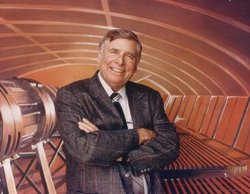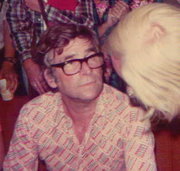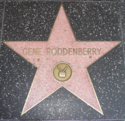Gene Roddenberry
Eugene Wesley Roddenberry (born August 19, 1921 in El Paso, Texas, USA - died October 24, 1991 in Santa Monica, California) was an American scriptwriter and producer. He is best known as the creator of the science fiction television series Star Trek, and was one of the first people to be buried in space. more...
Personal life
Roddenberry spent his boyhood in Los Angeles, California, where his family had moved so his father could pursue a career with the Los Angeles Police Department (LAPD). Following in his father's footsteps after high school, Roddenberry took classes in police studies at Los Angeles City College.
He later transferred his academic interest to aeronautical engineering and qualified for a pilot's license. Roddenberry joined the U.S. Army Air Corps in 1941 and became an aviator. He flew many combat B-17 missions in the Pacific Theatre and was awarded the Distinguished Flying Cross and the Air Medal. After leaving the service, he was a commercial pilot for Pan American World Airways (Pan Am).
Roddenberry left Pan Am to pursue writing for television in Los Angeles. He fell back on his early training as a policeman and joined the LAPD. He served the LAPD from 1949 – 1956.
Roddenberry was married twice. He had two children by his first wife, Eileen Rexroat (to whom he was married 27 years) — Dawn, and the late Darleen. His second marriage, in 1969, was to Majel Barrett, who played Nurse Christine Chapel in the original Star Trek series, Lwaxana Troi, and the voice of the computer in the later three series. He had one child, Rod Roddenberry, with Barrett.
Gene Roddenberry was a secular humanist. After his death, a lipstick-sized capsule of his ashes was sent into space to orbit the earth for six years (after which they burned up in the earth's atmosphere).
Television Career
Before Star Trek, Roddenberry wrote scripts for many of the popular television series of the 1950s, such as Have Gun, Will Travel. He produced The Lieutenant, a 1963-1964 NBC series about the United States Marines. He was also trying to get other science fiction series off the ground, mostly without success.
Roddenberry developed his idea for Star Trek in 1964. The series was finally picked up by Desilu Studios. The original $500,000 pilot received minor support from NBC, but the network commissioned an unprecedented second pilot. The series premiered on September 8, 1966 and ran for three seasons. Although it was cancelled due to low ratings, the series gained wide popularity in syndication.
Following the cancellation of Star Trek, Roddenberry pitched four sci-fi tv series concepts that all had pilot movies produced but were not picked up; The Questor Tapes, Genesis II, Planet Earth, and Strange New World. He also co-wrote and was executive producer on the made for TV movie, Spectre (1977).
During the 1970s, Roddenberry also lectured at universities around the country. He amused the attendees with anecdotes from the Star Trek set, spoke of his visions of the future and showed the Star Trek Blooper Reel, a collection of outtakes from the original series. Fans bestowed upon him the affectionate nickname "The Great Bird of the Galaxy" after a mythical creature referenced in an episode of the original Trek series.
Beginning in 1975, go-ahead was given by Paramount for Roddenberry to develop a sequel "Star Trek" television series based around as many of the original cast as could be recruited. This series was to be the anchor show of a new network, but plans by Paramount for this network were scrapped and plans were changed to do a Star Trek feature film. The result Star Trek: The Motion Picture had a lukewarm response, but nevertheless, several feature films and a new television series, Star Trek: The Next Generation, were created in the 1980s. Roddenberry was deeply involved with creating and producing Star Trek: The Next Generation, although his involvement lessened in seasons 2 and 3 due to deteriorating health. Star Trek also spawned the television series Star Trek: Deep Space Nine, Star Trek: Voyager and Star Trek: Enterprise.
Roddenberry only produced the first Star Trek film, Star Trek: The Motion Picture. Due to cost overruns and a problematic relationship with the Paramount management, Roddenberry was ousted and replaced by Harve Bennett. He continued as executive consultant on the next four films - Star Trek II: The Wrath of Khan, Star Trek III: The Search for Spock, Star Trek IV: The Voyage Home and Star Trek V: The Final Frontier. The last film based on the original Star Trek series, Star Trek VI: The Undiscovered Country was dedicated in Roddenberry's memory; he reportedly viewed a version of the film a few days before his death.
In addition to his film and TV work, Roddenberry also wrote the novelization for Star Trek: The Motion Picture, which was published in 1979 and was the first of hundreds of Star Trek based novels to be published by Pocket Books. It has been claimed by some that Alan Dean Foster was the ghost writer of the book, but this has been debunked, although Foster did contribute to the film's screenplay. Roddenberry talked of writing a second Trek novel but died before he was able to do so.
Controversy
Writers on Star Trek have charged that ideas they developed were later passed off by Roddenberry as his own, or that he lied about their contributions to the show at Star Trek conventions. Roddenberry was confronted by these writers, and apologized to them, but according to his critics, he continued to repeat the false claims.
In her autobiography, actress Nichelle Nichols who played Uhura in the first Star Trek series, reported having had a love affair with Roddenberry. She felt that his strong and controversial inclination to get her on the show had a lot to do with their relationship.
Read more at Wikipedia.org




